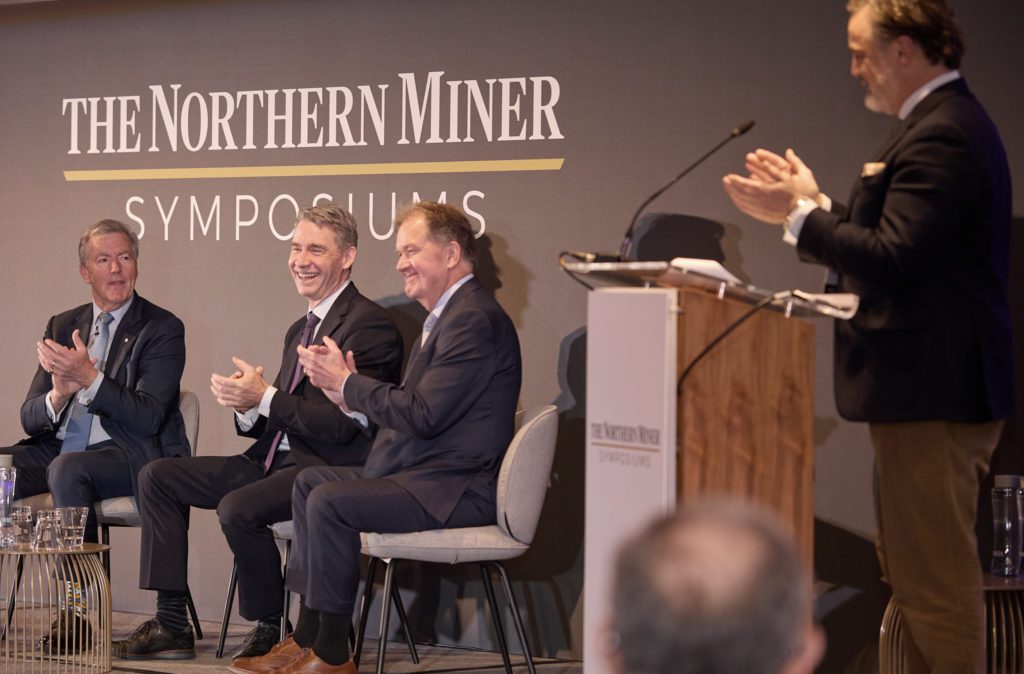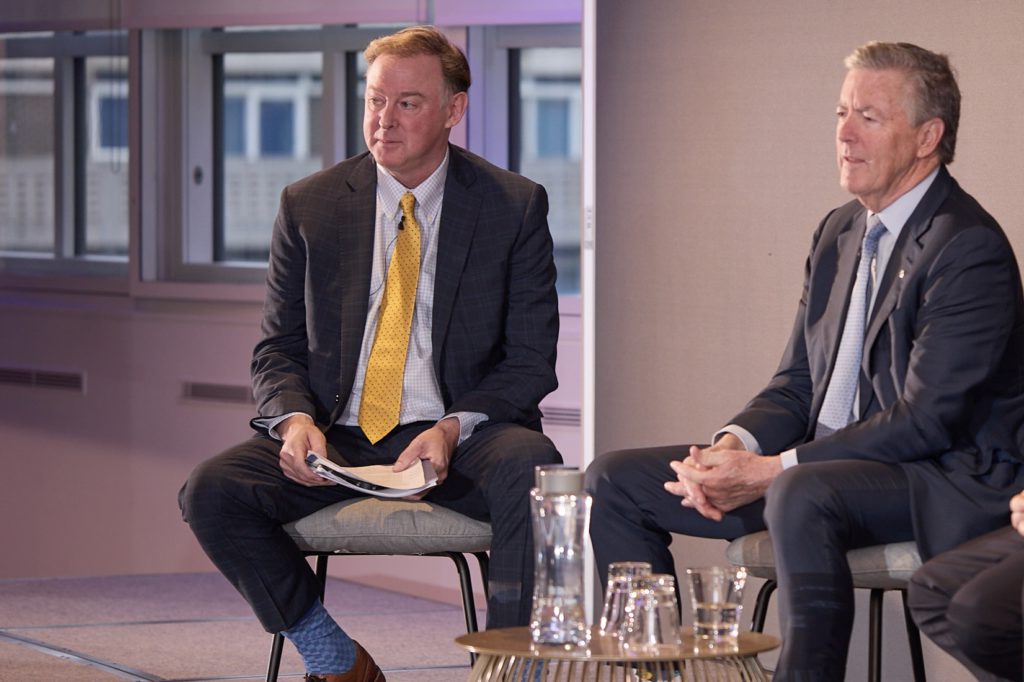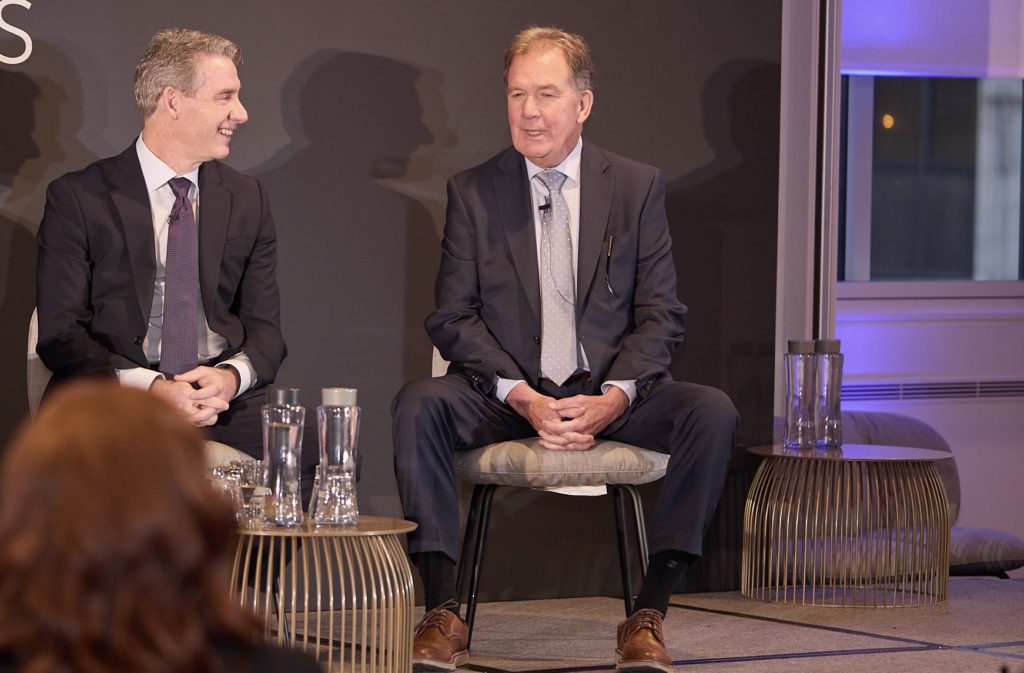London Symposium: ‘Mining must move at the pace of business, not bureaucracy,’ Ontario’s Pirie says


By Colin McClelland and Henry Lazenby
Ontario's bid to lead in the critical minerals boom in Canada is fuelled with funding increases and deregulation goals in a new mining code. Yet the province must still widen education and mining’s appeal, industry leaders said last week in London.
This year saw Iamgold (TSX: IMG; NYSE: IAG) start the $3 billion-capex Côté mine followed by Equinox Gold’s (TSX: EQX; NYSE: EQX) 400,000-oz.-a-year Greenstone gold mine as Queens Park counted around $44 billion promised by car makers such as Toyota and Stellantis (NYSE: STLA) for new battery plants and assembly lines. The developments coincided with efforts to quicken permitting and feed northern minerals to southern factories.
“Mining must move at the pace of business, not bureaucracy,” Ontario Minister of Mines George Pirie said at The Northern Miner’s International Metals Symposium on Dec. 2. “The new mining act is all about how we can shorten the time to get permits across the line, so we build these mines quicker, both for gold and critical minerals,” Pirie said.
Ontario is modernizing permitting, Pirie said on a panel showcasing the province’s gold mining, with Equinox chair Ross Beaty and Iamgold CEO Renaud Adams. Miners can take advantage of Ontario’s green energy grid while the government invests in education to address labour shortages and boost mining investment, he said.
Beaty, who has worked in 18 other countries, lauded the province’s history in mining as a foundation for the industry.
"One of the reasons Ontario is such a great place to mine is because it has that historical infrastructure that's come from the mining industry,” Beaty said. “We can get good workers. We have new technology, lots of suppliers that understand the business. That's why it's been such a successful place for us.”

Equinox’s $1.2-billion Greenstone mine, north of Lake Superior near Geraldton poured its first gold in May after three years of construction. Beaty says project backers in Ontario have all they need to succeed in mining if they have social licence, or the support of local communities. Beaty credited strong ties with five local First Nations for keeping Greenstone on track.
“The company has spent years and years developing goodwill with the community,” he said. “Once you have their support, other things become easy.”
Iamgold’s Côté mine has had similar success working with the Indigenous community not just on improving drinking water but the area’s flora and fauna, CEO Adams said.
“Waters protect our biodiversity, water matters,” he said. “This project was literally recreating a lake with the fish habitat and so forth. And that was done in part and partnership with the First Nation.”
Côté will contribute to Iamgold’s transformation into a mainly Canada-focused company, with 80% of its business now based in Ontario.
“This shift to more Canadian operations is not just about where we operate—it’s about how we operate,” Adams said.
Miners are benefitting from gold prices that have “gone bananas” to record highs, Beaty said, but the company leaders were cautious about how to spend the windfall. Beaty said Equinox would pay down debt and try to manage wage inflation while Adams said Iamgold would maintain financial discipline aligned with Côté’s US$1,500-per-oz. gold price assumption.
“Margin matters,” he said. “We’ve seen companies overextend in booms and collapse in busts. We can’t repeat those mistakes.”
The province has also lined up help for the industry to cope with inflated costs, from mapping resources to adding new technology and helping attract post-mining businesses, Pirie said.
“The first step is identifying the deposits, and then we've combined that with exploration incentives as well as innovation incentives, so that minerals will be processed there as well. So, it's matching the mineral potential in northern Ontario with the industrial might in southern Ontario.”
Meantime, the province has the critical minerals to eventually challenge Chinese control of the sector and Conservative Premier Doug Ford to confront U.S. president-elect Donald Trump’s tariff threats, the minister said. However, Beaty downplayed whether the tariffs against America’s main trading partners will ever be enacted.
“Every day Trump wakes up in the morning he has some outrageous bomb he wants to throw in. And whether it happens or not, it's a whole different thing.”

Another challenge is the industry’s perennial labour shortage, the panel pointed out. Mining programs at universities and colleges have declining enrolment, Beaty noted. This is forcing companies to look abroad for skilled workers.
“The world is small now,” Beaty said. “Ontario is a great place to learn modern techniques, but we need to rebuild the pipeline of talent.”
Iamgold is addressing the worker shortage with a strategy, Adams said.
"Of course, in the short term, innovations and technology play a role in mitigating the labour shortage," he said. “The next five years will see us applying technology to build more valuable and sustainable mine plans."
By 2035, Ontario will need 8,000 more employees in the mining sector, which means another 40,000 people into northern Ontario, Pirie said. A government poll showed 72% of the province’s population supports mining and 76% want to see more of it, the minister said. He described how Ontario is letting Grade 10 students explore trades via university and college programs.
“We’re not just building mines; we’re building communities," Pirie said. “We’re working with the education ministry to develop mining-specific curriculum for high school students, so they understand where materials come from and the role of mining in Ontario's economy.”
Beaty said gold’s high price should attract youth to mining, a flipside benefit to the wage inflation many mining companies have had to endure post-COVID-19.
“If the jobs are there, if they're well paid, you're going to end up having students go into those areas,” he said. “When metal prices are high, there's tons of jobs, and they're really well-paid jobs, like right now.”
Having a well-paid job doing exactly what he wanted is how Beaty recalled his first summers in the industry more than 50 years ago and the decades since.
“I've had just a dream career,” the Northern Miner Lifetime Achievement Award winner said. “I was paid to travel, I was paid to climb mountains. I just thought, this is, you know, pinch me. I would have done this for free.”
Comments